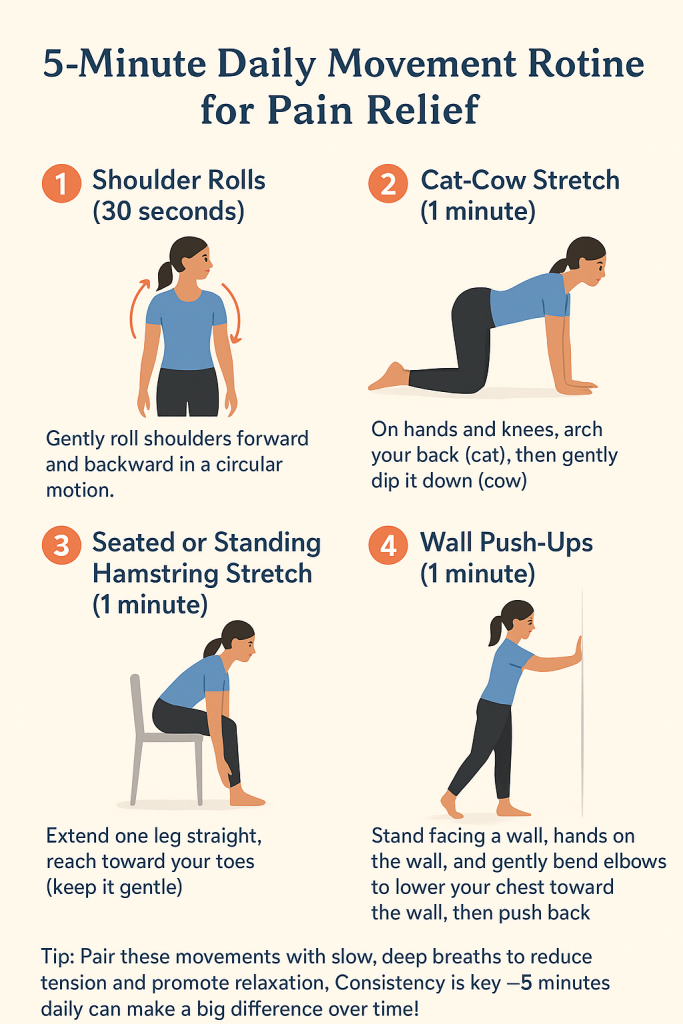September is Pain Awareness Month: Tips for Managing Chronic Musculoskeletal Pain
September is Pain Awareness Month, a reminder that chronic pain affects more than 50 million Americans. Musculoskeletal pain in the muscles, joints, tendons, or bones can make simple things like walking, lifting, or sitting uncomfortable. Nearly half of those living with chronic pain say it limits their daily activities.
Pain impacts more than your body. It affects sleep, mood, and quality of life. As an interventional pain management practice, I see firsthand how chronic pain can impact quality of life—limiting mobility, interfering with work, and affecting relationships. That’s why I focus on personalized care that combines professional treatment with practical strategies for movement and lifestyle management.
Understand Your Pain
The first step in managing chronic pain is understanding it. Musculoskeletal pain can come from a variety of sources, such as:
- Degenerative changes like arthritis or disc wear-and-tear
- Muscle and ligament strain from poor posture or repetitive use
- Nerve-related pain, like sciatica or pinched nerves
- Inflammatory conditions such as bursitis or tendonitis
An interventional pain specialist can help pinpoint the underlying cause through a detailed evaluation and diagnostic testing. Knowing the root cause allows for targeted treatment—rather than simply masking symptoms.
Stay Active
It may seem counterintuitive, but movement is medicine for many chronic pain conditions. Prolonged rest can actually make stiffness and pain worse.
- Low-impact activities like walking, swimming, or cycling help keep joints flexible and muscles strong.
- Water based therapy can be an excellent option to strengthen muscles without placing pressure on painful joints.
- Stretching and strengthening exercises—particularly core and back muscles—can help stabilize joints and relieve strain.
- Structured physical therapy guided by a trained therapist provides a safe way to regain mobility and strength.
Tip: If pain flares, modify rather than completely stop activity. Gentle movement can promote healing and prevent further loss of function.
Practice Good Posture and Ergonomics
Poor posture and repetitive strain are major contributors to chronic neck, shoulder, and back pain.
- Set up an ergonomic workspace with proper chair support, monitor height, and keyboard positioning.
- Take micro-breaks every 30–45 minutes to stretch and reset posture.
- Be mindful of lifting techniques: bend at the knees, keep the object close, and avoid twisting.
Utilize Interventional Pain Options
When conservative treatments aren’t enough, minimally invasive interventional procedures can provide significant relief. These treatments target the source of pain directly:
- Epidural steroid injections for nerve inflammation like sciatica
- Facet joint or medial branch blocks for arthritis-related back or neck pain
- Radiofrequency ablation (RFA) to “turn off” overactive pain nerves for longer-lasting relief
- Joint injections, such as for knees, hips, or shoulders
- Spinal cord stimulation (SCS) for complex, nerve-related pain conditions
These procedures are typically performed under image guidance in an outpatient setting, offering a fast recovery and minimal downtime.
Prioritize Mental Health
Chronic pain doesn’t just affect the body—it impacts mood, sleep, and mental well-being. Stress and depression can amplify the pain experience, creating a cycle that’s difficult to break.
- Mindfulness techniques such as meditation and deep breathing can calm the nervous system.
- Cognitive-behavioral therapy (CBT) helps reframe negative thought patterns around pain.
- Adequate sleep hygiene supports healing and resilience.
Work With a Pain Specialist
Every person’s pain journey is unique. At our practice, we focus on personalized, comprehensive care—integrating lifestyle changes, physical therapy, and advanced interventional treatments to create a plan tailored to you.
Our goal is not just to reduce pain but to restore function and improve quality of life. We have a team of specialists ready to help you regain control of your life.
Take the First Step Today
Pain Awareness Month is the perfect time to take charge of your health. If you or someone you love struggles with chronic musculoskeletal pain, reach out to an interventional pain management specialist. Relief is possible—and you don’t have to face it alone.
Schedule a consultation at Orthoillinois with our pain management specialists to learn about safe, effective options for long-term pain relief.



